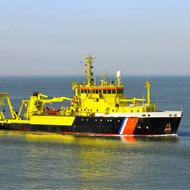Report highlights opportunities from UK oceans

The report notes a widespread lack of understanding of the sea and its value.
A major scientific report looking at the future of the sea has set out the challenges and opportunities a changing ocean can offer the UK.
The Foresight Future of the Sea report, compiled by the UK government, identifies four major areas that can deliver opportunities for the UK by exploiting its science and innovation. They include an improved understanding of the sea, greater coordination, a long-term approach to decision making and the increasingly global nature of the challenges we face.
Speaking at the launch of the report, professor Ed Hill from the National Oceanography Centre said: “I am pleased to welcome the Government Office for Science’s Foresight Future of the Sea report. As the report shows, marine science is a real UK strength – we are currently third in the world for the number of marine science publications.
“However, there is still more work to be done to achieve greater knowledge of the marine environment and the impacts of climate change. This will be critical for making a success of the future that this report anticipates.”
The report also outlines recommendations to help the UK utilise its current expertise and technological strengths to foster trade links, build marine capacity and collaborate to tackle climate change.
Professor Chris Whitty, interim chief government scientific adviser, said: “Our Foresight projects have an excellent reputation for tackling big strategic issues, and the Foresight ‘Future of the Sea’ project report is no different. This report highlights the key challenges and opportunities a changing ocean offers the UK based on extensive scientific evidence gathering.”
Foreign and Commonwealth Office minister Lord (Tariq) Ahmad of Wimbledon added: “Both the opportunities and the challenges set out in this important report are global in scale and demand our urgent attention. The UK is rightly recognised as a world leader in the marine and maritime fields.
“We must keep pushing our scientific understanding of the oceans, harness new technologies, and support commercial innovation. Most of all, we must ensure that governments keep pace with this changing environment. International collaboration remains crucial in order to realise the fullest benefits of our marine industries and scientists, for the UK and the world.”



 The veterinary mental health charity Vetlife is inviting the veterinary community to join it for a sponsored cold-water dip.
The veterinary mental health charity Vetlife is inviting the veterinary community to join it for a sponsored cold-water dip.